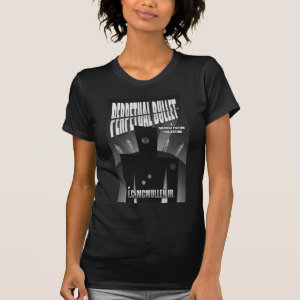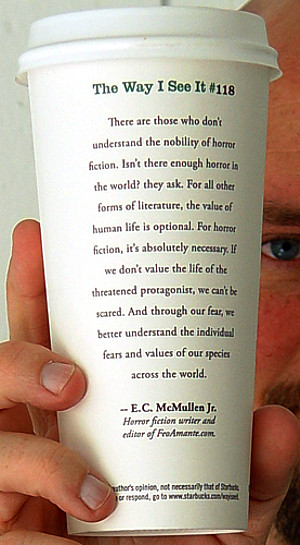When You Buy My Books
E.C. McMullen Jr.
PERPETUAL
BULLET
 "'Some People' ... may be the standout story in the book."
"'Some People' ... may be the standout story in the book."- John Grant, Infinityplus
E.C. McMullen Jr.
WILLOW BLUE
 "'Willow Blue' will burrow under your skin and stay there long after you've put the book down."
"'Willow Blue' will burrow under your skin and stay there long after you've put the book down."- Jeffrey Reddick, Creator of
FINAL DESTINATION
IN OTHER BOOKS
E.C. McMullen Jr.'s
short story
CEDO LOOKED LIKE PEOPLE
in the anthology
FEAR THE REAPER
 "This Ray Bradbury-esque is one of the most memorable and one of the more original stories I've read in a long time."
"This Ray Bradbury-esque is one of the most memorable and one of the more original stories I've read in a long time."- Amazon Review
HORROR 201:
The Silver Scream
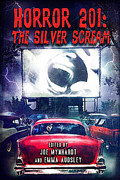 Filmmaker's Guidebook
Filmmaker's Guidebookfeaturing
RAY BRADBURY,
JOHN CARPENTER,
WES CRAVEN,
TOM HOLLAND,
E.C. McMULLEN Jr.,
GEORGE A. ROMERO,
and many more.
Extensively quoted in
 PHANTASM
PHANTASMEXHUMED
The Unauthorized Companion
Robert S. Rhine's
SATAN'S 3-RING
CIRCUS OF HELL
 Forward by
Forward byGAHAN WILSON &
FEO AMANTE.
Featuring comics by
ALEX PARDEE,
WILLIAM STOUT,
STEVE BISSETTE,
FRANK DIETZ,
JIM SMITH,
FRANK FORTE,
ERIC PIGORS,
MIKE SOSNOWSKI,
OMAHA PEREZ,
DAVID HARTMAN,
STEVEN MANNION,
and more!
Also
IN CINEMA
E.C. McMullen Jr.
Head Production Designer
 MINE GAMES
MINE GAMES(Starring:
JOSEPH CROSS, BRIANA EVIGAN,
ALEX MERAZ)
Dept. head
Special Effects Make-Up
(SFX MUA)
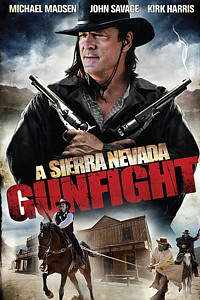 A SIERRA NEVADA
A SIERRA NEVADAGUNFIGHT
(MICHAEL MADSEN & JOHN SAVAGE).
Production Designer
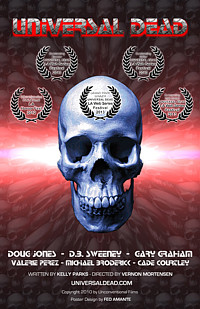 UNIVERSAL DEAD
UNIVERSAL DEAD(DOUG JONES,
D.B. SWEENEY,
GARY GRAHAM)
ART DIRECTOR
 THE CRUSADER
THE CRUSADER(COLIN CUNNINGHAM,
GARY GRAHAM)
| SWIMMING WITH THE POND SCUM Another view of the new Horror Thriller Generation |
 |
Report by E.C.McMullen Jr. Copyright 2002 by E.C.McMullen Jr. for feoamante.com |
(Feo note: To best understand this article, please read Paula Guran's essay Tribal Stand at locusmag.com.)
On Monday, September 9, 2002, Horror publisher / Editor / Writer, Paula Guran wrote an article decrying the lack of substance found in today's Horror Literature. In essence, there was little literature to be found in modern Horror.
This epiphany came upon her, she says (though, having read Paula for many years, I've the feeling that she has nurtured this feeling for a very long time.) "at one gathering of the horror tribe or another: the distressing realization that so few in our field still seek professionalism, a high level of achievement, legitimate credits, and to gain a sense of history — attributes that combine to set what we might call the Standard."^
I seriously doubt the sudden "distressing realization". Far more likely that this article is a timed attack, based on the outcome of elections in the Horror Writers Association.* I'll get to that in a moment.
The "Standard" of which Paula speaks is thus: "You're a writer when a Writer says you're one."
Not a bad "Standard" as far as standards go, and to some extent, valuable. Because Paula goes on to demonstrate this lack of standard.
"While this may sound exclusive or prejudicial, no Secret Masters or hierarchies or Star Chambers are involved." Paula says. "This merely acknowledges that tribal elders merit respect. Why? Because they were here before you, just might know a thing or two you don't, and if you sit next to them at the campfire and listen, you just might learn something."
Paula refers to history and gives a reasonably accurate view of the birth of Horror (In the world of entertainment, it's much younger than Rock and Roll). Paula accurately speaks of Horror as a marketable commodity, and while there were certainly Horror writers before the 1970s of which she speaks, there was not the actual genre moniker of "Horror". Lovecraft (though he once wrote his definition of the term "Horror") was a writer of Weird Tales. Poe was a writer of Mystery and Imagination. Henry James wrote charming little ghost tales that can best be defined as "Lit. lite": Suitable for dreary little tea parties and self absorbed "salons". Not the kind of gatherings that would ever open a book by the Marquis de Sade unless they were feeling "terribly naughty" that night.
It is arguable, but Stephen King (as Paula asserts) probably started Horror as a literary form, genre, or "ghetto of literature" (as defined by Doug E. Winter in his well known and wonderful essay, "The Pathos of Genre" on why Horror wasn't a genre.). This may explain why King remains at the top of the heap to this day despite the many novelists of his generation: Ira Levin, Michael Crichton, and William Peter Blatty.
Paula also goes on to describe the Horror boom of the nineteen eighties as the worst time for Horror literature. When Publishers were eager to publish any benighted piece of crap if it could be shoved down the shelf of a Horror section of the local Walden Books.
Paula quotes Dan Simmons, writer/editor Karl Edward Wagner, and some nameless others who welcomed the downturn and eventual implosion of Horror in the early to mid nineties as a chance to shake off the flakes and dimwits who wrote hack after clichéd piece of garbage and stamped it Horror. Simmons blamed the greedy Publishers and sloppy editors, as well as the lazy writers, and he was right.
At least, that shakedown would have occurred, Paula says with just the right amount of drama and mystery (that a writer cannot resist), if it weren't for something else that came to pass. Something that was just starting to crawl over the horizon and, because of its youth, was initially overlooked.
That was the Internet, gang!
"Hi there! Would you care to repeat to my face what you said about me on the Horror World message boards?"
Paula describes the new generation of Horror writers that came with the birth of the Internet:
"In the mid-90s, many changes were occurring in both publishing as a whole and horror as its tiny part. Those actually in the profession were reacting with understandable slowness and confusion. This is too vast a subject to try to cover here, but for this context you can look back to 1994-95 and see a cusp. The old advice was no longer applicable, although a lot of well-meaning old advisors did not yet realize this. Horror-as-a-genre was already dead, but most were scrambling for the last scraps or hoping for new salvation (briefly thought to be coming from gaming). With doom descending there were those who still wanted to blame someone or something, when really there could be no simple scapegoat.
The current generation of horrorists began spawning in an abyss. The newcomers were just as enthusiastic, just as strident and derivative and awful as any who came before. Maybe worse, because they were one more generation removed from true feeling — a Xerox of a Xerox of a Xerox, to the point where the copies were no longer legible.
Yes, the hacks, bottom-feeders, and lemmings began bailing out of the shrinking pond of horror. But it was not the good who always survived in the remaining shallow puddle. Some good writers had the ability to remain good writers and stay in the game by disguising horror as something else or writing something other than horror. It was tough luck for some writers of originality who were discarded. But many of the those most lacking in talent had no where else to go. They weren't versatile enough to write anything else, so they remained. Some saw their betters leaving the pond for more healthful waters and realized there might be an advantage in that for them. Some bottom-feeders stayed because there was less competition for the scum that was left.
They planted themselves in the mud and whined.
Thanks in large part to the networking capacity of the Internet, the wannabes could, for the first time, easily find their peers. The Net also became was an efficient way to set oneself up as a false writing idol. The mud-whiners were, to the wannabes, "real writers" to be looked up to and listened to. The wannabes and the mud-whiners found great strength in one another."~
Paula rightly assails the foolish morons who are rapid with their cowardly e-mail attacks and message board flames. This was tiresome back in 1996 and it's still going on in 2002 by the same people who wrote this crap six years ago. Tiny little pin prick egos, or cowering squeaking hypocrites that shut up damn quick when you step up to them at a convention and say,
"Hi there! Would you care to repeat to my face what you said about me on the Horror World message boards?"
Even worse are the gutless cowards who make these posts anonymously. But they will always be with us: These nameless, faceless voices shouting from the crowd will be at every gathering, trying to stir up, instigate, and tear down any organization.
But where to point the finger for this new group who don't give a tinker's damn for real writing? Paula lays much of the blame on the new feet (on the rebirth?) of small press publishing.
"Out of this has emerged what we might call the "minuscule press." The primary fallacy — "anybody can be a writer" — has exacerbated into "anybody can be a publisher." Minuscule horror press consists in part of what we used to call self-publishing or vanity publishing. In part it promotes the Publishing Buddy System: A buddy of yours becomes your publisher; you become your buddy's publisher. No one ever has to deal with an editor's opinion, judgment or, for that matter, assistance. (Most don't even have to be slowed down by something as mundane as copy-editing.) No one has to work and re-work a story or novel and improve it to the point of acceptability. No one needs to learn the craft of writing. No one even needs to fill in plot holes the size of Lake Erie or to be told a story lacks logic or characterization or is an overdone cliché.
Just grind it out, accumulate approbation from your similarly-ranked pals, and vigorously ignore the Standard.
The princes and princesses of the minuscule press read each other — as well as many in the almost-small press and the smallest of the mass market — congratulate each other, publish each other, edit each other, blurb each other, review each other, recommend each other for awards, twirl around together in an unending incestuous dance of parochialism while giving the finger to anyone who dares mention something as passé as a standard of excellence. Professionalism? You'll find more of that in any Girl Scout during the annual cookie sale.
And the tragedy is that the most self-aware among this new breed know they don't measure up to Real Writers, and are happy to tread water in an eddy that is 90% pointless, derivative crap, appearing in dreadfully-conceived anthologies full of amateurs, or excreting another novel-length waste of time about vampire cockroaches.
The more delusional among them have no reason not to believe that the loudest voice wins the debate. Operating under the misapprehension that an Internet connection makes them the epistolatory equivalent of H.P. Lovecraft reborn, they lay siege through e-mails, message boards, and chat rooms, easily finding other mud-whiners to mentor and succor them. They have learned the flashy trick of using attractive Web design to promote sub-par work - classic sleight of hand learned from modern advertising — and attract the gullible and the foolish into buying the lie that they really are writers."*
In case you haven't noticed it yet, Paula's argument is starting to unravel, as the above snubs self-promotion. As if it only matters if you or your publisher can afford to pay someone else to promote you. Even more contradictory is the fact that Paula holds her place in the Horror community specifically because of her own self-promotion and little else. She is an editor because she made herself an editor. She has a small press anthology out because she made it (and in this article she honestly admits to it). Yet at the same time, Paula decries this action when others do it. With this article, Paula is trying to validate her own work, speaking as a voice of (limited) experience, while attacking others whose body of work is equal to, if not greater, than hers.
Now understand, taken as a whole, I agree with much of what Paula has to say. Most of the Horror being written these days is dross garbage. Instead, I disagree with the direction her finger points.
"90 percent of everything is crap."
-Theodore Sturgeon
Paula pretty much finishes up her article with these words,
"Now, there's absolutely nothing wrong with the idea of a group of like-minded people uniting to promote public awareness of the best their field has to offer; that is the raison d'etre of any organizational effort among artists. But the grail has been...misplaced. If offered an opportunity to promote the latest in horror, few foolishly waste time actually investigating what is being published. Why bother when you have your own book or press to push? Reviews? Don't worry about integrity, it's just another promotional opportunity for yourself, and the chum produced by your chums.
"Don't be concerned that some truly terrible books and stories make it into the hands of readers who will be so insulted they will never come back to horror. Who remembers the '80s anyway. Awards? Why look for and try to conscientiously select works that achieve true excellence in the field? How silly. Just recommend each other and don't bother to read the rest. And don't forget to scoff at any effort by the knowledgeable to seek out and reward excellence — deem them snobs and denigrate them whenever possible.
As for those of you with the most to offer horror, don't call attention to the problems. Stay silent. Making too much noise is impolite. Be like me and spend years trying to avoid upsetting anyone and trying not to give offense. You'll lose anyway. As Richard Matheson said, "It doesn't have to make sense. The mere fact that you exist means somebody out there hates your guts." When the reek of rotting rectitude gets too rank to bear any longer, quietly creep away from the stench in embarrassment ... just as most of your peers and betters have, before you. If there is a truth here, dismiss it as a squabble of decades past with no relevance to the here and now."+
From now on, this article will direct itself as a rebuttal in respect to the specific passages quoted here. If you still haven't read Paula Guran essay, Tribal Stand, at locusmag.com, please do so now.
^"so few in our field still seek...attributes that combine to set what we might call the Standard."
Here Paula refers to "The Standard" in writing. And it's a very good method of determining quality. But it must be stressed that The Standard is a living thing.
Everyone in this group, and Paula and I attend pretty much the same conventions so I am intimately aware of the group she speaks of, seek out the experience of their favorite writers, even embarrassing some of them by calling them "child-hood heroes".
They learn what they can from The Standard, but they also recognize that the Standard changes and grows - and it only does so by the quarrelsome noise of a generation who insist on setting new standards. This is how humanity evolves on a social scale both large and small. It is because of this ever changing "Standard" that the voice of women in writing isn't simply tolerated, but respected and given credence. Your writing is what matters. Not your skin color, sex or sexual orientation. So out of this boiling, enthusiastic, strident, though sometimes derivative and even untalented pool of hot gas, stars are born.
Derivative? In the beginning many talented artists are derivative. The Beatles tried to imitate Chuck Berry. Chuck Berry tried to imitate white kids imitating black people. This is how some of the best talents start out, before discovering themselves. In art school students are taught to paint like Renoir. Musicians are taught to write like Mozart and learn the fretwork of blues musicians of old. Writers today try to write like Lovecraft from before who tried to write like those who inspired him and so on. We begin derivative, we learn from our chosen masters or heros, and if we are talented, move on from there.
So there must be more to the Standard than waiting for another writer to call you a writer. Major cities like Tokyo, Los Angeles, New York, and London have long nurtured their local boys and girls who could never crack a nut as large as the world. Could never even crack a smaller nut like their country. Yet they become the darlings of local critics and the bohemian art-house theater patrons who equate their own intelligence and self worth with how much they spend a month at ten seat theater houses and side alley art shows. What's important, what has meaning, is when you can appeal to a far larger audience. An audience made up of people from all walks of life. People whose lives and livelihood is as disparate from one another as a Texan Cowboy from a Munich dance club hopper. A true writer can reach inside these people and touch that common thread.
Stephen King can do that, touch a common thread and communicate to the masses, and that is why he is so popular. And it's important to remember the incredible non-uniformity of those masses. They are not faceless drones and they are not gray proles without intellect or value. They are people who share our feelings even if their strongest most cherished beliefs are poles apart from my own - from ours.
"tribal elders merit respect."
It is not enough to garner admittance into the cherished inner sanctum of your group, however respectable those peers may be. Though their admiration may be worthwhile, and some of them may even be your heroes, it is important to remember that new directions must always be sought, and the old guard rarely approves of the vanguard. What's important to remember about those new directions is that they will be tested by many. And many are part of that fabled 90% of which Theodore Sturgeon believed were crap.
But even that 90% crap have their contributions. In the context of the birth of Rock and Roll (Because this article refers to the birth of Horror and where its going wrong) we have Elvis, The Beatles, and Led Zepplin. But there were smaller contributors (sales-wise, in their day) like Jerry Lee Lewis, Chuck Berry, Little Richard, The Beach Boys, Jimi Hendrix, and The Rolling Stones. They too had their value.
Even the one hit wonders made their mark, contributed in their tiny meager way. Even Donnie Iris (Who? Donnie ... nevermind) gave something. Inspiration can be found everywhere, anywhere, and the many who are putting out crap are not intentionally putting out crap. They are trying to discover if they have found a new direction. Are they going to be a pioneer or will they get lost along the way? Can they go deeper than Ed Lee, Richard Laymon and the rest? And by doing so, is that a better way? Is there something there? Something they can touch, tell, communicate to people?
Most of them won't be successful. But they don't simply pull up stakes and leave for greener pastures. Many, having put all of their effort into what they love, discover that they were wrong. For all of their passion and love for what they were doing, at the end of the tunnel there was no light, just the end of the cave.
Their dreams will be crushed, the smarmy insects who mindlessly crowed "I told you so!" will rejoice. Exhausted, rejected, and hurt, the losers will walk off the stage while someone else gets the rousing applause. Some go in search of other ways to communicate. Maybe it was just the style they chose; maybe they could be better at something else: they go off in a new discovery of themselves.
~ The primary fallacy — "anybody can be a writer" — has exacerbated into "anybody can be a publisher."
Before Paula said this, in the same article, mere paragraphs above, she quoted Dan Simmons as saying that the garbage that passed for Horror Literature in the 1980s was due to "greedy publishers, sloppy editors..."
You can't attack these major publishers and editors for their greed and sloppiness, and then turn your nose up at the new generation of small press publishers.
If the major players are too greedy or piggish and drop the ball or don't care to even carry it, where else is a writer to turn? And if the market is still there, as small press has shown that it certainly is (so much so that major publishers and major agencies are now eyeing small press books for new talent to cull), why should anyone ignore it?
Back in 1997 and 1998, major book publishers were folding up their carnival canvases and proclaiming Horror dead. At that same time, PC games were turning out major sellers like ZORK, DOOM, MYST, QUAKE, and RESIDENT EVIL - every one of them a Horror / Thriller game and the biggest sellers of all time (Computer/console games outsell the entire movie industry by about 3 to 1).
Then, in 1999, the book publishing industry was further caught napping by the rash of Horror releases from Hollywood and independent movie makers. The biggest money makers out-did both Steven Spielberg's effort, THE HAUNTING, and George Lucas, Star Wars: The Phantom Menace. THE BLAIR WITCH PROJECT was made by young people in junior freaking college and garnered more profit than Star Wars at the theater.
M. Night Shyamalan became the new name of Horror, to be later associated with the likes of Alfred Hitchcock and Steven Spielberg. Doug Clegg decided to try his hand at launching an e-novel, NAOMI. The success of which got him an interview in WIRED magazine and probably inspired Steven King to try the web out next. King's short story made him more money in 1 week than any short story he had ever sold to anyone anywhere.
The Internet became a major contender and the old publishing houses HATED it. The market was still there. The money was still there. What wasn't there was the major publisher's ability to tap into it.
They had betrayed the Horror hungry fans with over a decade of what Wagner called "pointless, derivative crap". What was worse, in 1998 it started to look like the major publishers might not be able to get that market back. Small press publishers were giving the fans what they wanted, and there certainly was no more crap this time than there was before. What was in place was an understanding. Because these books came from small press publishers, expectations were lowered even though the price was raised.
When you bought a book from a major house, you expected to get your money's worth. These publishers had been around forever, they tightly controlled the publishing market, they hired the best and brightest and had years of experience and knowledge behind them. When they start churning out shit, one smells a rat.
On the other hand, if you get a dud from a small press publisher, you went in knowing that these stories would be talent in the raw.
Who the hell were these people? You didn't know! They were folks you never heard of! Yvonne Navarro? Joe Nassise? Weston Ochse? Harry Shannon? David Whitman? And there were anthologies filled with people like Tim Lebbon, Brian Keene, Michael Oliveri, Ed Lee, Sephera Giron, and Monica J. O'Rourke? You had no idea about any of these people.
In 1998 I sure as hell never heard of these people. But I bought those books. Apparently, so did a lot of others. Richard Laymon proclaimed some of them the new vanguard of Horror. And if you want respect from the old guard, you can't get much more respectable than that. Many of them have gone on to major book contracts, mass market published, and even movie contracts. EVEN - current events just revealed - high office in the Horror Writers Association.
From out of that massive boiling pool comes a little talent.
"Some people have got it and some people don't. You haven't got it."
-A major Paramount Pictures executive giving his expert opinion to Harrison Ford.
"Keep looking."
-A memo from a studio exec who didn't think Sean Connery was right for the part of James Bond.
Tom Clancy likes to say that he was rejected by every major publisher ten times before a small press publisher (in this case a U.S. Naval text book publisher) gave him a break.
The essence of what I'm saying is this. The experts cannot always be trusted, and especially if these experts caused the problem in the first place, then abandoned their responsibility to it, why in the world should you turn to them of all people for validation?
How long should we wait for the major houses to get their act together and why should we? Life is short. To be even more precise, why should I trust the blessings of a publisher that is still churning out "new" titles from a writer who not only did not write them, but has been dead for over 20 years?
*"They have learned the flashy trick of using attractive Web design to promote sub-par work ... and attract the gullible and the foolish into buying the lie that they really are writers."
How wrong can it be for writers, even small time beginning writers, to present their work in as nice a package as possible? Is this only acceptable if the writer has the money of a major publisher to build them a really spiffy site?
If this person has the ability to do it themselves - or get a friend to do it - then where is the harm? And how many of that writer's fans are gullible and foolish before they are finally accepted as cutting edge literati: first to appreciate the new talent? How long were Tim Lebbon's fans "gullible and foolish"?
Is someone as (largely) small press or midlist as John Shirley to be associated with gullible and foolish fans? To be fair, Paula Guran does say that there are bright talents among these people, but who is to choose? Many of these people I mentioned came from this Internet pool and, unfortunately but to a large extent, blurb each others books.
That said, they were all or individually heaped with accolades ranging from fellow writers like Richard Laymon, John Shirley, and Richard Matheson. But again, what is wrong with presenting your work with the best cover possible? Does it matter that your work is not ready to live up to the professional expectations set by the web page? Does it matter that the stories within your magazine have nothing to do with the hot babe in the bikini on the cover?
+"As for those of you with the most to offer horror, don't call attention to the problems. Stay silent. Making too much noise is impolite. Be like me and spend years trying to avoid upsetting anyone and trying not to give offense."
I'm guessing that this last part was meant to be tongue in cheek, as Paula is well aware that she has never spent her time "trying to avoid upsetting anyone and trying not to give offense".
The persona she chose for darkecho, and the way she writes her newsletters is of the same cut as Olde Hollywoodland Hedda Hopper, with a dash of bandit queen and Jerry Springer. But while Paula goes about attacking the seeds just starting to sprout, before they have even had the chance to grow, let alone bloom, other, more established and even best selling writers like Douglas Clegg, William F. Nolan, Richard Laymon, Peter Straub, as well as prolific lesser selling talents like Joe R. Lansdale, and John Shirley, have gone about at these same conventions giving encouragement, advice, tips, and most of all, their time to these same adoring fans / writers who are more than eager to question and listen.
The thing is, people who have something of value to offer tend to shy away from caustic, acidic characters. Caustic people attract hooting, mean spirited vandals. They attract Jerry Springer and Ricki Lake audiences who are only interested in destruction. Is your acid the truth? So what? Even if that acid can kill the pond scum, it also kills the gold fish. If speaking your mind or your experience means complaining instead of encouraging, setting fires instead of growing forests, then it may be because you haven't garnered the experience to promote growth.
Even so, it doesn't mean you should shut up. It does mean you should recognize your talents and act accordingly.
"Why do you ask your neighbor, 'Let me remove the splinter from your eye.' when you have a beam in your own? Remove the beam from your eye first."
- Attributed to Jesus Christ
Finally, this last bit is highly suspect
"...congratulate each other, publish each other, edit each other, blurb each other, review each other, recommend each other for awards, twirl around together in an unending incestuous dance of parochialism..."
In 2000 at the World Horror Convention in Denver, Colorado, Paula Guran presided in high positions of power on both the Horror Writers Association and the International Horror Guild. She was nominated in both organizations for the same website (Internet!), darkecho.com (now deceased).
Now whether she voted or not is inconsequential. In the realm of speaking out against these folks who "twirl around in an unending incestuous dance of parochialism", Paula was easily surrounded by cronies and friends in both organizations.
Whether they voted their consciences in a respectable manner or sided with cronyism is also beside the point. The point here is, to remove all question of conflict of interest, Paula Guran should have done the right thing and removed herself from the vote.
She did not.
Many of the people who voted were not best selling authors or top list writers. Many of them were small press and short story writers. Some had not had a professional sale in quite a while. Basically, many of these people who voted would appear to be the very people Paula demonizes in her essay at locusmag.com. And yet... Paula Guran's darkecho.com won both awards, from two different organizations, that year. From that moment on, the finger pointing pointed right back at Paula. Not because she was highly critical, not because she had never wrote a mass market published novel, not because of any other reason but that there was a highly suspect conflict of interest that Paula did nothing to diffuse.
Her response was in fact, the whine she stains other people with: The very same whine with which she ends her article. The worst part about this article is the same something that has always haunted Paula, one she chooses to ignore. It tears down without offering anything constructive. And as for Paula's voice of experience, she is known more for networking and politicking than creating any substantive work in this field of Horror.
Doesn't mean she has nothing of value to offer. With everything I'm writing here, I still like Paula. Some of my friends would disagree and that is their opinion. But at every convention I will still greet her with genuine warmth, a hug if she welcomes one, and conversation.
Paula has something positive to offer the Horror community, even if she chooses to hide it behind a caustic persona. I've attended many of these same conventions Paula refers to. I know precisely the people and types of people of which she speaks. Many of them are churning out crap, many of them wrongly consider themselves true writers when they aren't. But consider: David S. Goyer was one of the worst writers in Hollywood before he came into his own with DARK CITY, and later again with BLADE. John Skipp and Craig Spector remain branded with one of the worst A NIGHTMARE ON ELM STREET movies ever made. Schow wrote the heartbreaking and twisted THE KILLING RIFF, and adapted/co-wrote the beautiful THE CROW (with John Shirley) but he also wrote CRITTERS 4!
So what should I do? Is the best course to draw a line in the sand, designate myself adjudicator more through political manuevering than any substantive contribution to the form, and decide who will and who may not enter that pantheon known as professionalism? Is having an Us vs Them mentality the best plan of action?
Of course not. Its not for me or any other single individual to decide. Every individual has their specific likes and dislikes and will always rule against even a magnificent work of art if it does not suit their taste. So who should judge? Call it the market, call it the masses, call them the great unwashed if you feel particularly mean spirited, but it is the reader who decides. The hundreds of them - The thousands and millions of them - It doesn't matter if they cannot recognize "true art". This is writing. And writing means communication. If you cannot communicate to the wildly disparate masses, with all of their myriad walks of life; if you can only speak to the small minority, then take pride in your small achievements, but leave your bitterness behind.
The rest of us: the "group" she bemoans that accepts everyone as a writer; will continue to write and encourage each other. We will pat each other on the back.
The group she could be a part of, if she only would encourage instead of discourage, will remain.
What Paula is dead wrong about is this; nearly all of this group seek out the advice of their elders, their mentors, people who know. I've sought out the advice of Doug Clegg, who, in turn, gave me a great bit of information when he told me to seek out Robert McKee: One of the most inspirational people I've ever read.
I've sat down and shot the shit with Ray Bradbury, who wanted to just kick back and talk and listen to his fans. He did this, while the self-important professors of this particular University, snubbed the very people they were trying to sell their University published tomes to (!).
I spoke to Richard Laymon and you never met a more encouraging, honest, and helpful guy. The very brief time I spent with him, moments actually, gave me hope and drive. I sat down with William F. Nolan and listened to what he had to say. His anecdotes (helpful and illuminating - the real truth of getting published and what you must go through, regardless of how good your writing may be) are making me smile right now as I recall them.
Now then, multiply me times the number of these other folks. My brothers and sisters. My kindred. Some of their writing makes me cringe, not because its good and affects me on an emotional level, but because its just so damn awful. Would that writing get any better if I tore them down? Of course not. No one learns by being berated. Successful teachers, good teachers, are those who inspire. They don't choose who they will and won't inspire, instead they try and lift the entire class, every class, every hour.
Why? Because 90% of every class will produce crap. That's the way it is.
What a thing to realize, eh? You look at your friends, these people you've invested your time and emotions into. Who will rise? Who will write one crap story after another and then, suddenly, surprise us all? Many of us don't know it yet, but we are part of that 90% crap. Who will it be? Who will win and who will lose? Who knows? There are many who will be discouraged, disheartened, and have to face the bitter truth. One among us may write a single literary classic and have nothing more to say. Another of us may make a lifetime career out of churning out one popular title after another but never write that one magnum opus.
Still we encourage each other. Give each other tips.
"I spoke to "X" the other day and he recommended "Y"'s "Z". Have you read it? Its incredible! It really opened my eyes!"
We listen to Ellen Datlow when she speaks because she has proven herself. We listen to John Pelan, Gahan Wilson, and the many others at their panels or, if panels bore us, we try and talk to these people outside of the panel. We do this because the large majority of us in the Horror community, who fight and flame and boil away in this mad pool that births talent, will come away knowing we can never be anything more than fans. But that being said, the losers in this game and in this group which has no walls, no proving ground, no fences and no doors, will go away knowing that they were given every chance, by their peers, to shine. Call it incestuous, call it parochialism or find another acidic stamp to burn into this mentality. All it takes to be a part of this crowd is a kind word, a kind deed, and an honest desire to give at least as much as you take.
We are aware of the problems and we do more than address them, expose them, and trash them. We offer solutions, even if that solution is only, "Go ask this person, they would know better than me."
How wrong can that be?
Listen Paula: while you were busy trying to create your "Stable of writers" as you once called it, there was an entire herd of wild mustangs out there running through the hills. You could have chose to run with the mustangs, you chose to stay on the farm. To this very day, as evidenced by your article, the only one keeping you there is you. But as far as the readers are concerned, it seems they prefer to watch wild horses, than ones in captivity. You could have run with us. Instead you chose to step on us. How easy to step on the newbies and beginners. How very easy. You took the easy way out, Paula. If you ever get your act together, you can still run with us, as all are welcome. In the end, you may not be able to keep up, but that's a risk we're all taking. No one knows who is going to go all the way. Are you willing to take that risk? Or are you going to sit and jeer from the sidelines?
-E.C.McMullen Jr.
*After publication, Paula sent me an email to clarify an assumption I made with this article.
Dear Eddie,
I don't want anyone to think this is true. It's not:
*I seriously doubt the sudden "distressing realization". Far more likely that this article is a timed attack, based on the outcome of elections in the Horror Writers Association...*
The article's genesis was in April at WHC. The first draft came in May. I spoke to several people about it in June at HWA. In one form or another it's been read by several other people. The timing was no timing at all. I just felt it should be published by someone other than myself. I had pitched several ideas (reviews and interviews) to Mark Kelly earlier this summer. I later pitched more. He said he always neeeded essays. I submitted it. He decided to publish. That's it.
You have no idea of my thoughts on HWA.
Best,
Paula
![]()
END
| GET COVERED | |
| FEO AMANTE'S HORROR THRILLER Created by: E.C.MULLEN JR. |
| COME FOLLOW ME @ Amazon |
| ECMJr |
| Feo Blog |
| IMDb |
| Stage32 |
| YouTube |
| Zazzle Shop |
WANT TO READ RELATED ARTICLES?
|
